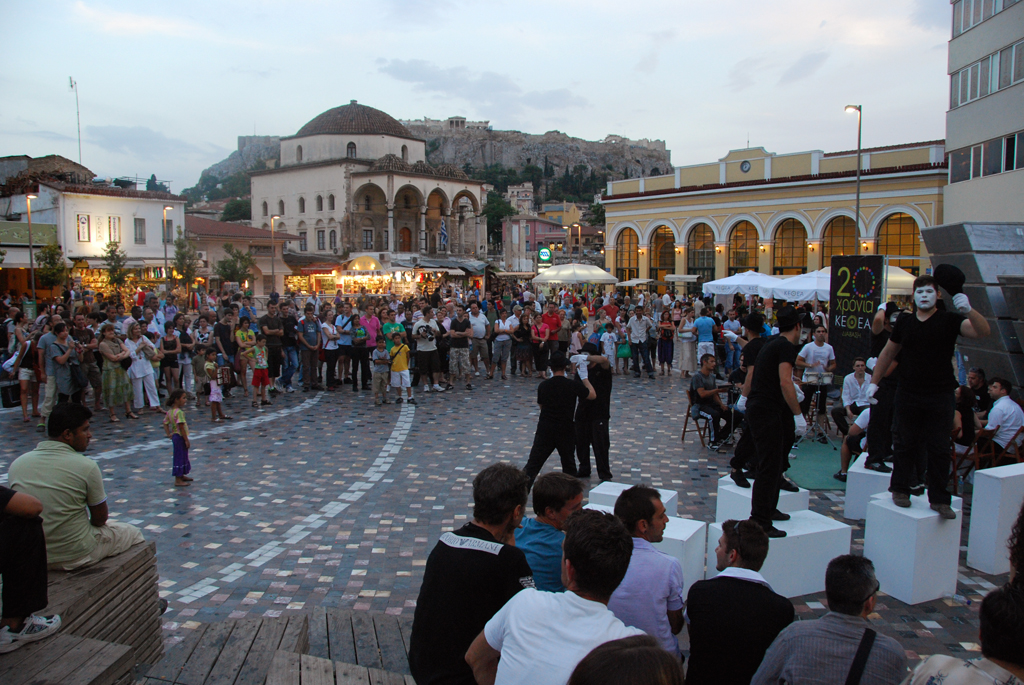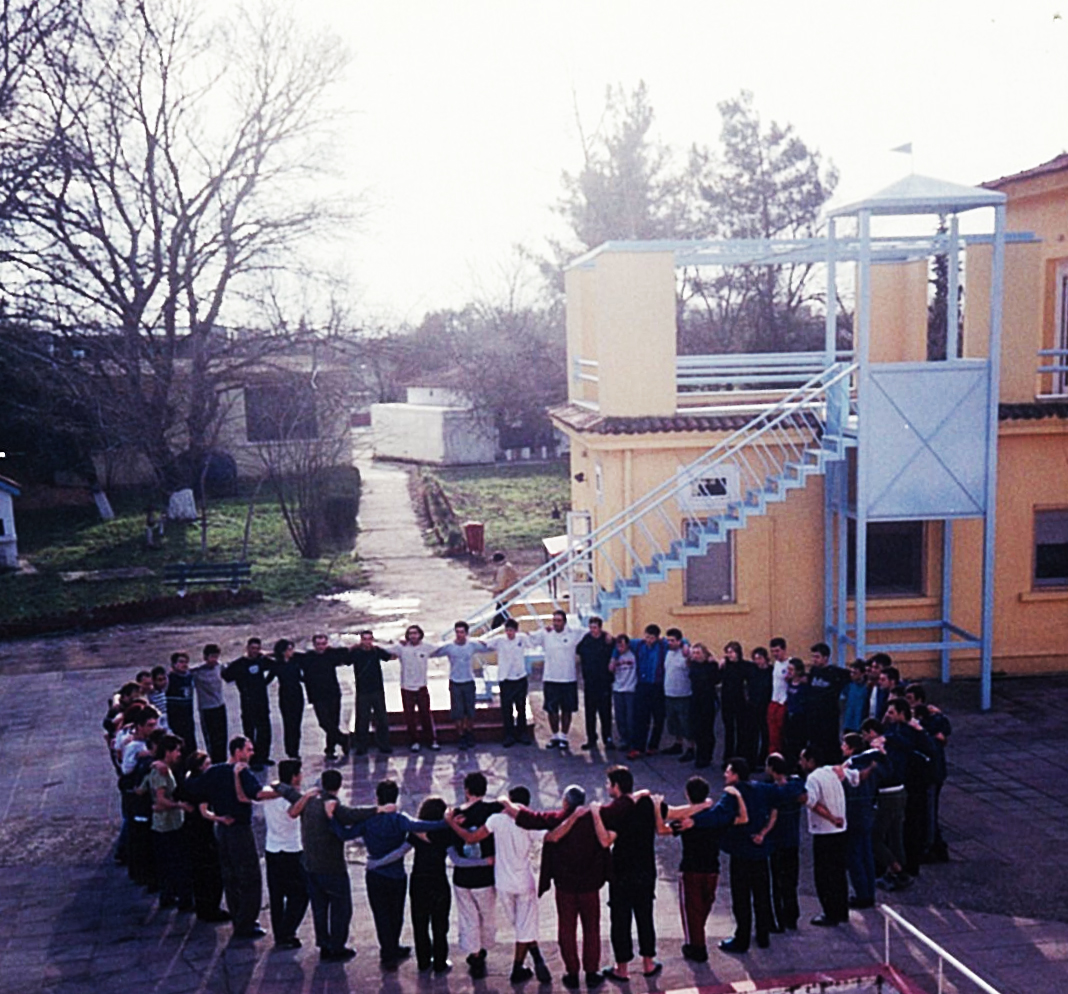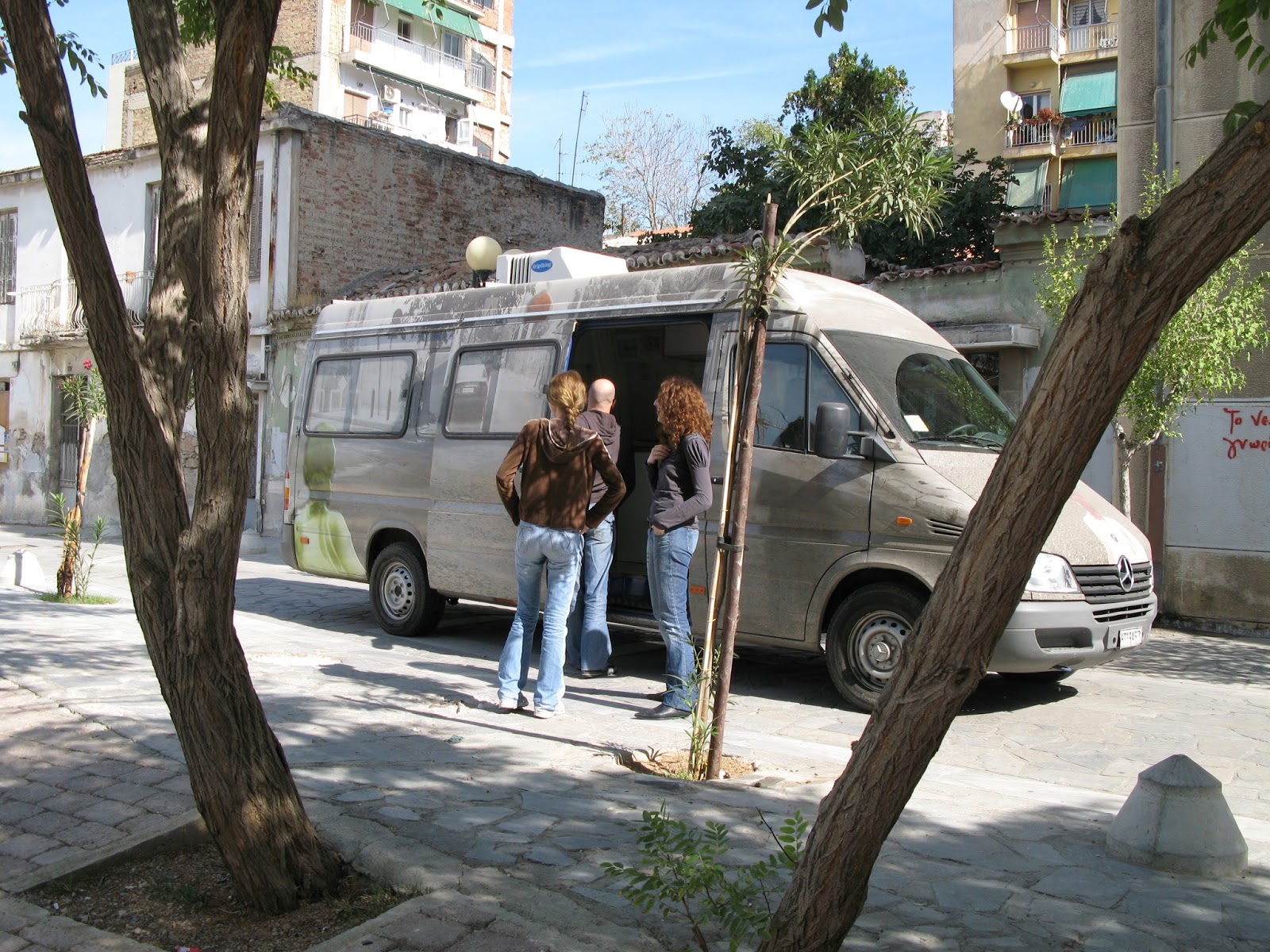KETHEA from Greece – addiction therapy in times of crisis
 By Denise
By DeniseNanni and Milena Rampoldi, ProMosaik. In the following our interview with
KETHEA, the Therapy Center for Dependent Individuals” in Greece, struggling
against drug addiction, and helping drug addicted people. We talked to Marina
about the center, its activities, objectives, and projects. Would like to thank
Marina very much for her impulses. ProMosaik is convinced that the international
exchange of experience in this field is fundamental to develop innovating
strategies to face this challenge.

How
was KETHEA founded?
was KETHEA founded?
KETHEA (acronym for “Therapy Center for Dependent
Individuals” in Greek) is the first organization established in Greece for the
purpose of drug addiction treatment. It started out as a pilot project in 1983,
when ITHAKI, the first Greek Therapeutic Community was founded in northern
Greece. Until then drug users would end up either in prison or in a psychiatric
hospital, as no specialised treatment option was available. KETHEA helped
overcome the myth that addiction can’t be treated and paved the way for the
rehabilitation and social integration of addicted people in the country. Within
a few years KETHEA evolved into a nation-wide network of services for drug
users and their families.
Individuals” in Greek) is the first organization established in Greece for the
purpose of drug addiction treatment. It started out as a pilot project in 1983,
when ITHAKI, the first Greek Therapeutic Community was founded in northern
Greece. Until then drug users would end up either in prison or in a psychiatric
hospital, as no specialised treatment option was available. KETHEA helped
overcome the myth that addiction can’t be treated and paved the way for the
rehabilitation and social integration of addicted people in the country. Within
a few years KETHEA evolved into a nation-wide network of services for drug
users and their families.
Which
kind of services do you offer to people who ask for your assistance?
kind of services do you offer to people who ask for your assistance?
KETHEA offers its services within community, prison and residential
settings, and has the capacity to respond to clients with diverse needs,
including adults, adolescents, parents, immigrants, refugees, prison inmates,
released prisoners, alcoholics, gamblers and pathological internet users, at
every stage of their recovery.
settings, and has the capacity to respond to clients with diverse needs,
including adults, adolescents, parents, immigrants, refugees, prison inmates,
released prisoners, alcoholics, gamblers and pathological internet users, at
every stage of their recovery.
KETHEA programmes are drug-free and offer a comprehensive continuum of
services, focusing on the recovery and the development of a new way of living,
where the individual is a productive and equal member of the society. All
services are provided free of charge.
services, focusing on the recovery and the development of a new way of living,
where the individual is a productive and equal member of the society. All
services are provided free of charge.
The KETHEA treatment programme is based on the psychosocial model of
Therapeutic Communities, one of the most effective approaches to tackling
addiction. KETHEA has adapted this model
to the needs of the full range of Greek drug addicts.
Therapeutic Communities, one of the most effective approaches to tackling
addiction. KETHEA has adapted this model
to the needs of the full range of Greek drug addicts.
KETHEA believes that effective treatment needs to go beyond drug abuse and
offer an overall therapeutic process
that addresses every aspect of an individual’s life, i.e. their emotional, mental and physical health, family
and social relations, history of offences, education, employment, housing etc.
offer an overall therapeutic process
that addresses every aspect of an individual’s life, i.e. their emotional, mental and physical health, family
and social relations, history of offences, education, employment, housing etc.
Members of KETHEA treatment programmes have to participate actively and
commit to change. They need to gain an insight into and understanding of why
they use drugs, take responsibility for their situation, and gain control over
their lives.
commit to change. They need to gain an insight into and understanding of why
they use drugs, take responsibility for their situation, and gain control over
their lives.
KETHEA also runs school and community based prevention and early
intervention programmes and is active in training and research in the field of
addiction.
intervention programmes and is active in training and research in the field of
addiction.

How do
you address social reintegration who suffered from addiction?
you address social reintegration who suffered from addiction?
People who complete
the main treatment phase of KETHEA’s therapeutic programs move on to Re-entry
Centres, where they receive counselling and psychological support aimed at
facilitating their gradual and smooth reintegration into society. At this
stage, the aim is to organize the former addict’s personal and social life on a
new footing featuring economic independence, healthy, supportive relationships
and creative goals.
the main treatment phase of KETHEA’s therapeutic programs move on to Re-entry
Centres, where they receive counselling and psychological support aimed at
facilitating their gradual and smooth reintegration into society. At this
stage, the aim is to organize the former addict’s personal and social life on a
new footing featuring economic independence, healthy, supportive relationships
and creative goals.
Education and
training in collaboration with specialized agencies, vocational guidance and
counselling to support integration into the labour market, legal support for
pending legal issues and relapse prevention training are important components
of this effort.
training in collaboration with specialized agencies, vocational guidance and
counselling to support integration into the labour market, legal support for
pending legal issues and relapse prevention training are important components
of this effort.
How does the recession affect drug addiction and the work of KETHEA?
The economic crisis has had a dramatic effect on the physical and mental health
of the Greek population. The data show that rising unemployment and a
significant fall in income has led to a clear deterioration in various
indicators, including an increase in
depression, suicide rates and the use of legal and illegal substances.
of the Greek population. The data show that rising unemployment and a
significant fall in income has led to a clear deterioration in various
indicators, including an increase in
depression, suicide rates and the use of legal and illegal substances.
The recession has also had a negative impact on existing drug-related
problems, worsening physical health, increasing levels of homelessness,
self-destructive behavior, and the
marginalization of drug users. HIV/AIDS and other infectious diseases, such as Hepatitis C, have increased
among drug users. More expensive drugs give way to cheap substances, such as
Sisha, a combination of methamphetamine and dangerous chemicals, also called
the “drug of the poor”.
problems, worsening physical health, increasing levels of homelessness,
self-destructive behavior, and the
marginalization of drug users. HIV/AIDS and other infectious diseases, such as Hepatitis C, have increased
among drug users. More expensive drugs give way to cheap substances, such as
Sisha, a combination of methamphetamine and dangerous chemicals, also called
the “drug of the poor”.
Furthermore, a bleak outlook for the post-treatment stage will most likely discourage
drug users from contacting treatment and rehabilitation services. High unemployment makes the professional and
social rehabilitation of former drug users even more difficult, increasing the
risk of a relapse.
drug users from contacting treatment and rehabilitation services. High unemployment makes the professional and
social rehabilitation of former drug users even more difficult, increasing the
risk of a relapse.
In this difficult period, KETHEA is being called upon to respond to
increasing needs while facing budget and personnel cuts.
increasing needs while facing budget and personnel cuts.

Why do we have to invest in the treatment of addiction in times of crisis?
There is solid
scientific evidence that if the needs of dependent persons are not addressed in
a therapeutic manner, the cost to society and the state is far greater. Data shows that for every €1 invested in a KETHEA
Therapeutic Community, society saves between €4.6 and €6.5, depending on the
type of treatment programme (residential, out-patient, day care). The savings
result from reducing the costs associated with substance abuse, which include
criminal activities, persecution and incarceration, hospitalisation and
unemployment. Drug treatment also costs less than confinement.
scientific evidence that if the needs of dependent persons are not addressed in
a therapeutic manner, the cost to society and the state is far greater. Data shows that for every €1 invested in a KETHEA
Therapeutic Community, society saves between €4.6 and €6.5, depending on the
type of treatment programme (residential, out-patient, day care). The savings
result from reducing the costs associated with substance abuse, which include
criminal activities, persecution and incarceration, hospitalisation and
unemployment. Drug treatment also costs less than confinement.
The outcome effectiveness of KETHEA
Therapeutic Communities increases the benefits to society over time, since a
significant proportion of Therapeutic Community members will abstain from drug use and delinquency and
re-enter society and the active workforce.
Therapeutic Communities increases the benefits to society over time, since a
significant proportion of Therapeutic Community members will abstain from drug use and delinquency and
re-enter society and the active workforce.
These
results indicate that the treatment of addiction is a social, humanitarian and
economic imperative, particularly in times of economic crisis, which pose a
threat to social cohesion, while increasing substance use.
results indicate that the treatment of addiction is a social, humanitarian and
economic imperative, particularly in times of economic crisis, which pose a
threat to social cohesion, while increasing substance use.
Do you
carry out any awareness raising activity? If yes, how has civil society been
responsive so far?
carry out any awareness raising activity? If yes, how has civil society been
responsive so far?
The development of an open and creative relationship
with the society is one of the major aspects of treatment in KETHEA programmes.
The members of KETHEA programmes
throughout Greece carry out open information events, environment-friendly
interventions, sport events, exhibitions, musical and theatrical performances
etc. all year round, aiming at raising awareness and fighting stigma. KETHEA also runs an annual campaign to mark World Drug Day(June 26th ); the
campaign is funded by donations from stakeholders, the Media, professionals,
companies, institutions and individuals.
with the society is one of the major aspects of treatment in KETHEA programmes.
The members of KETHEA programmes
throughout Greece carry out open information events, environment-friendly
interventions, sport events, exhibitions, musical and theatrical performances
etc. all year round, aiming at raising awareness and fighting stigma. KETHEA also runs an annual campaign to mark World Drug Day(June 26th ); the
campaign is funded by donations from stakeholders, the Media, professionals,
companies, institutions and individuals.
Since the onset of the economic crisis, KETHEA’s information and public
awareness activities have been focused on: educating the public and
policy-makers about the consequences of the recession on mental health, drug
abuse and social exclusion, and fostering solidarity with vulnerable groups, as
well as advocating the right of addicted people to quality recovery-oriented
treatment.
awareness activities have been focused on: educating the public and
policy-makers about the consequences of the recession on mental health, drug
abuse and social exclusion, and fostering solidarity with vulnerable groups, as
well as advocating the right of addicted people to quality recovery-oriented
treatment.
Do you
cooperate with local authorities and institutions? If yes, how?
cooperate with local authorities and institutions? If yes, how?
KETHEA has established a wide network of
cooperation with Greek and foreign entities in the fields of health care and
social welfare, treatment of addictions, university and professional training
and scientific research. These collaborations seek to address the needs of
addicts and their families more effectively, and to promote scientific
knowledge and evidence-based practice. KETHEA also develops synergies with
local authorities, in order to tackle drug addiction on a local level. In recent years, more than 15
requests from various areas of Greece have been submitted to KETHEA relating to
the setting up of new units. In response, KETHEA has increased its cooperation
with local authorities, which generally provide the premises for the new units
and cover the initial operating costs of newly launched programmes. KETHEA
provides the personnel and has full clinical and administrative supervision of
the services. KETHEA also cooperates with local authorities
in the framework of awareness-raising, prevention and training programmes etc.
cooperation with Greek and foreign entities in the fields of health care and
social welfare, treatment of addictions, university and professional training
and scientific research. These collaborations seek to address the needs of
addicts and their families more effectively, and to promote scientific
knowledge and evidence-based practice. KETHEA also develops synergies with
local authorities, in order to tackle drug addiction on a local level. In recent years, more than 15
requests from various areas of Greece have been submitted to KETHEA relating to
the setting up of new units. In response, KETHEA has increased its cooperation
with local authorities, which generally provide the premises for the new units
and cover the initial operating costs of newly launched programmes. KETHEA
provides the personnel and has full clinical and administrative supervision of
the services. KETHEA also cooperates with local authorities
in the framework of awareness-raising, prevention and training programmes etc.


